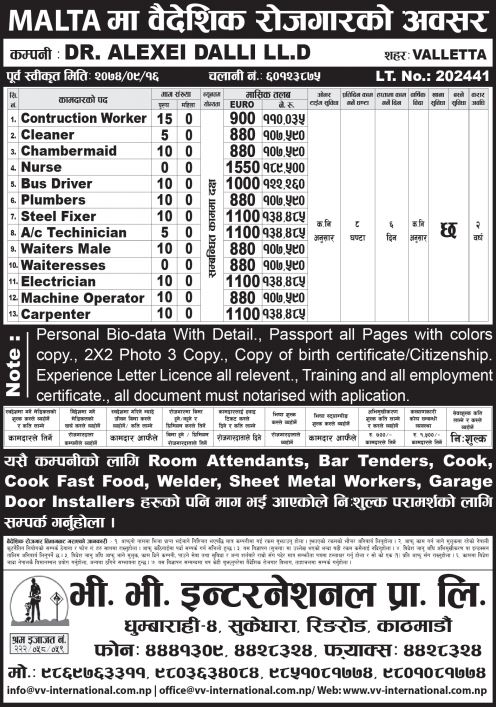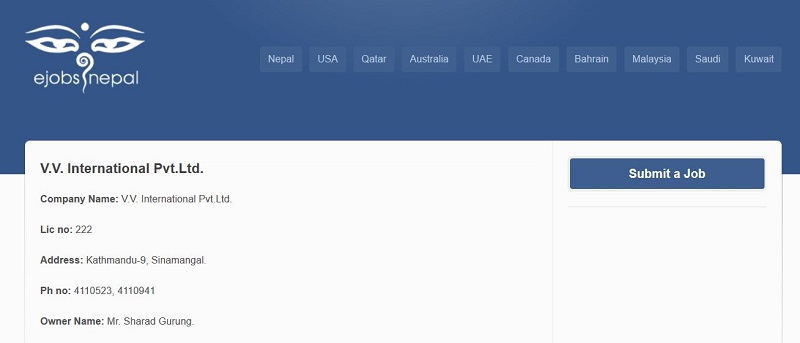Adverts recruiting workers in Nepal and India for jobs in Malta are promoting working conditions that are likely to be in breach to Malta’s employment laws, The Shift News can reveal.
On Sunday, The Shift News shed light on the proliferation of agents and consultants placing adverts in news portals in Nepal and India offering jobs in Malta in batches of 100.
Lawyer Alexei Dalli, a consultant for VV International, based in Kathmandu, Nepal, had told The Shift News that workers brought to Malta worked a 40-hour week.
Further investigation by The Shift News in collaboration with journalists in Nepal confirmed the adverts referred to a six-day week (48 hours) with unclear conditions on overtime pay, bonuses and leave due.

Dalli, an agent for Malta’s residency by investment programme and Malta’s cash for citizenship programme which require applicants to invest in the country, is also an agent for the ‘importation’ of workers at the lower end of the salary scale. He told The Shift News he had never managed to get any workers into Malta from south Asian countries. The advert referred to was placed in his name by VV International.
They offer jobs ranging from construction workers to carpenters and from chambermaids to waitresses and bus drivers. The contract period is for two years, and the adverts state that board and accommodation is offered. Yet leave and overtime is paid “according to company rules” not national law.
READ MORE:
Former Mossack Fonseca client linked to Malta residency and visa programme
The “critical situation” in the labour market – also highlighted by the Malta Employer’s Association – has led to a proliferation of agencies and consultancies to import workers from countries like Nepal, India and Pakistan. These often have links to other companies in China. Tracing the often complex network of agencies across countries is no mean feat.
Recent arrests related to the importation of workers from south Asian countries only scratched at the surface of a problem that needs to be addressed through increased transparency and regulation of ‘recruitment agencies’, a former diplomat told The Shift News on condition of anonymity.
Just over two weeks ago, a 41-year old was arrested in Nepal for sending workers to a list of countries including Malta and leaving them stranded. It followed arrests of Pakistani workers in Dubai headed for Malta, and arraignments for trafficking in relation to a cleaning company.
READ MORE:
Arrest in Nepal for trafficking of workers to Malta
“The need for workers has led to an ‘open door policy’ but there is a lack of transparency on how these agencies are operating, which can lead to abuse,” the former diplomat said.
Yet the proliferation of agencies, and the lack of standardisation is also leading to confusion among employers who are also approached by foreign nationals “who barely speak English” offering a steady stream of workers.
“We’ve been approached by different individuals but you never really know what you’re dealing with. Some can barely speak English and they’re offering you workers. They all say they operate legally and some show you what they say is an official letter from the government of Nepal,” the manager of a services company said.
Other business owners, mostly in the services and construction industry, confirmed they had been shown similar letters. Yet official documents from the country should not be taken at face value.
“The country has been through two earthquakes and a humanitarian crisis. Official records were wiped out in some places. Information is not reliable,” he said.

He said it was easy for traffickers to pose as legitimate recruiters to entice workers to the prospect of wealth. But often, all that happens is they get stuck in a cycle of debt.
“It is often the most vulnerable in these countries who sell the family land and borrow money to make the trip, only to spend the rest of their life in debt. If they are lucky, they land a job at €800 a month which barely covers rent and food in Malta.
“The ‘critical’ problem in the labour market is not skill but the fact that we want to keep salaries low. Then we have a slave economy. It’’ the Gulf model”, he said.
The solution lies in increased transparency. Recruitment agencies must be accredited, the services should be clear and fees listed, he said.













